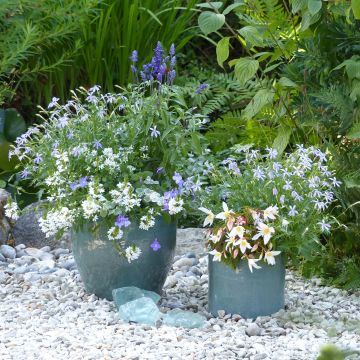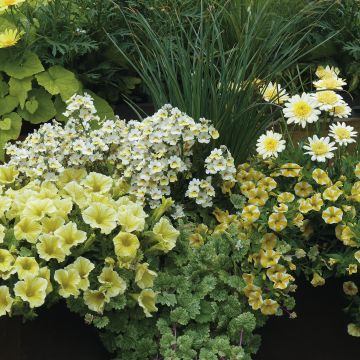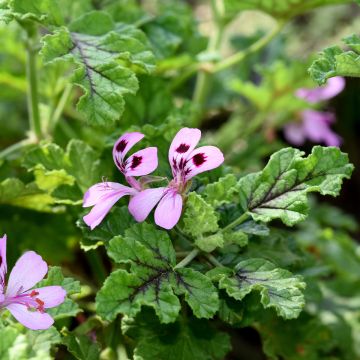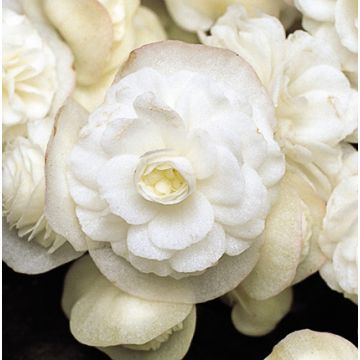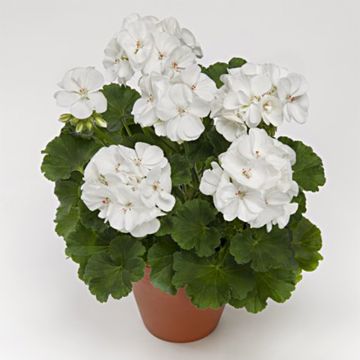

Dianthus barbatus Precurseur - Sweet William
Dianthus barbatus Precurseur - Sweet William
Dianthus barbatus Precurseur
Sweet William, Poet's Carnation
Simple, yet always beautiful, these carnations of the poet.
alice C., 10/05/2018
Special offer!
Receive a €20 voucher for any order over €90 (excluding delivery costs, credit notes, and plastic-free options)!
1- Add your favorite plants to your cart.
2- Once you have reached €90, confirm your order (you can even choose the delivery date!).
3- As soon as your order is shipped, you will receive an email containing your voucher code, valid for 3 months (90 days).
Your voucher is unique and can only be used once, for any order with a minimum value of €20, excluding delivery costs.
Can be combined with other current offers, non-divisible and non-refundable.
Why not try an alternative variety in stock?
View all →This plant carries a 6 months recovery warranty
More information
We guarantee the quality of our plants for a full growing cycle, and will replace at our expense any plant that fails to recover under normal climatic and planting conditions.

Would this plant suit my garden?
Set up your Plantfit profile →
Description
Dianthus barbatus Précurseur is a variety of Sweet William (or Poet's Carnation) particularly suited for cut flowers. On reaching a height of 80 cm (32in), large single flowers appear in pink or white, with fringed petals. This early variety offers the bucolic charm of its flowers for two months if care is taken to remove faded blooms, and helps to lighten the beds of heavier perennials. This plant is generally biennial, but can be an ephemeral perennial in mild climates, and is easy to grow in cool, rich, well-drained soil, in full sun or partial shade.
Dianthus barbatus is a plant of the Caryophyllaceae family found in many temperate regions of Europe and Asia. It is not very long-lasting as not very hardy, and is most often considered biennial, flowering in the second year after sowing. The plant forms a very tight basal clump of long, pointed leaves in the first year, light green to glaucous in colour. The flowering of the 'Precurseur' selection occurs very early in spring and lasts until early summer. Its very large flowers are gathered in flat cymes and borne at the end of thin, sturdy stems 80 cm (32in) tall. The flowers are either very bright fuchsia pink or white, depending on the plants, and show excellent vase life. The scent of the flowers is both spicy and sweet, reminiscent of cloves and cinnamon.
Sweet Wiliam is an easy-to-grow plant that requires minimal maintenance once well established. Like bellflowers and columbines, these plants have a place in all gardens and bouquets, imbuing them with poetry and mystery. Choose a prominent location, for example along a path or near an entrance, to fully enjoy the plant's sweet fragrance. In flowerbeds, plant carnations en masse to create beautiful splashes of colour, and let them spread to the vegetable garden where they can supply cut flowers for bouquets. They can also be grown in pots on the terrace or balcony, with stakes for the taller ones, ensuring proper drainage and occasional fertilisation.
Note: Please be aware that our plug plants are professional products reserved for experienced gardeners. Upon receipt, transplant them as soon as possible into pots, containers, or directly into flowerbeds.
Report an error about the product description
Dianthus barbatus Precurseur - Sweet William in pictures




Flowering
Foliage
Plant habit
Botanical data
Dianthus
barbatus
Precurseur
Caryophyllaceae
Sweet William, Poet's Carnation
Cultivar or hybrid
Other Sweet William
View all →Planting and care
This Poet's Carnation grows in any light, fresh, rich soil, even clay or limestone, if exposed to full sun. A traditional feature of wild gardens, it self-seeds spontaneously when the faded flowers are not cut, but not always reliably.
Planting period
Intended location
Care
-
, onOrder confirmed
Reply from on Promesse de fleurs
Similar products
Haven't found what you were looking for?
Hardiness is the lowest winter temperature a plant can endure without suffering serious damage or even dying. However, hardiness is affected by location (a sheltered area, such as a patio), protection (winter cover) and soil type (hardiness is improved by well-drained soil).

Photo Sharing Terms & Conditions
In order to encourage gardeners to interact and share their experiences, Promesse de fleurs offers various media enabling content to be uploaded onto its Site - in particular via the ‘Photo sharing’ module.
The User agrees to refrain from:
- Posting any content that is illegal, prejudicial, insulting, racist, inciteful to hatred, revisionist, contrary to public decency, that infringes on privacy or on the privacy rights of third parties, in particular the publicity rights of persons and goods, intellectual property rights, or the right to privacy.
- Submitting content on behalf of a third party;
- Impersonate the identity of a third party and/or publish any personal information about a third party;
In general, the User undertakes to refrain from any unethical behaviour.
All Content (in particular text, comments, files, images, photos, videos, creative works, etc.), which may be subject to property or intellectual property rights, image or other private rights, shall remain the property of the User, subject to the limited rights granted by the terms of the licence granted by Promesse de fleurs as stated below. Users are at liberty to publish or not to publish such Content on the Site, notably via the ‘Photo Sharing’ facility, and accept that this Content shall be made public and freely accessible, notably on the Internet.
Users further acknowledge, undertake to have ,and guarantee that they hold all necessary rights and permissions to publish such material on the Site, in particular with regard to the legislation in force pertaining to any privacy, property, intellectual property, image, or contractual rights, or rights of any other nature. By publishing such Content on the Site, Users acknowledge accepting full liability as publishers of the Content within the meaning of the law, and grant Promesse de fleurs, free of charge, an inclusive, worldwide licence for the said Content for the entire duration of its publication, including all reproduction, representation, up/downloading, displaying, performing, transmission, and storage rights.
Users also grant permission for their name to be linked to the Content and accept that this link may not always be made available.
By engaging in posting material, Users consent to their Content becoming automatically accessible on the Internet, in particular on other sites and/or blogs and/or web pages of the Promesse de fleurs site, including in particular social pages and the Promesse de fleurs catalogue.
Users may secure the removal of entrusted content free of charge by issuing a simple request via our contact form.
The flowering period indicated on our website applies to countries and regions located in USDA zone 8 (France, the United Kingdom, Ireland, the Netherlands, etc.)
It will vary according to where you live:
- In zones 9 to 10 (Italy, Spain, Greece, etc.), flowering will occur about 2 to 4 weeks earlier.
- In zones 6 to 7 (Germany, Poland, Slovenia, and lower mountainous regions), flowering will be delayed by 2 to 3 weeks.
- In zone 5 (Central Europe, Scandinavia), blooming will be delayed by 3 to 5 weeks.
In temperate climates, pruning of spring-flowering shrubs (forsythia, spireas, etc.) should be done just after flowering.
Pruning of summer-flowering shrubs (Indian Lilac, Perovskia, etc.) can be done in winter or spring.
In cold regions as well as with frost-sensitive plants, avoid pruning too early when severe frosts may still occur.
The planting period indicated on our website applies to countries and regions located in USDA zone 8 (France, United Kingdom, Ireland, Netherlands).
It will vary according to where you live:
- In Mediterranean zones (Marseille, Madrid, Milan, etc.), autumn and winter are the best planting periods.
- In continental zones (Strasbourg, Munich, Vienna, etc.), delay planting by 2 to 3 weeks in spring and bring it forward by 2 to 4 weeks in autumn.
- In mountainous regions (the Alps, Pyrenees, Carpathians, etc.), it is best to plant in late spring (May-June) or late summer (August-September).
The harvesting period indicated on our website applies to countries and regions in USDA zone 8 (France, England, Ireland, the Netherlands).
In colder areas (Scandinavia, Poland, Austria...) fruit and vegetable harvests are likely to be delayed by 3-4 weeks.
In warmer areas (Italy, Spain, Greece, etc.), harvesting will probably take place earlier, depending on weather conditions.
The sowing periods indicated on our website apply to countries and regions within USDA Zone 8 (France, UK, Ireland, Netherlands).
In colder areas (Scandinavia, Poland, Austria...), delay any outdoor sowing by 3-4 weeks, or sow under glass.
In warmer climes (Italy, Spain, Greece, etc.), bring outdoor sowing forward by a few weeks.









































